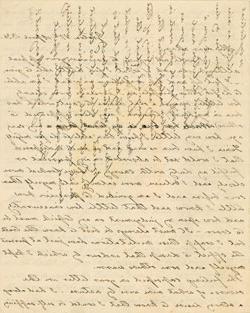Collections Online
Letter from Margaret Fuller to Mary Peabody, 17 April 1836
To order an image, navigate to the full
display and click "request this image"
on the blue toolbar.
This letter from Margaret Fuller to Mary Peabody (later Mrs. Horace Mann) offers a fascinating glimpse into the life and mind of one of the great Transcendentalist thinkers of the nineteenth century. Written on 17 April 1836, when Fuller was just twenty-five years old, the letter dates from the beginning of her remarkable fifteen-year career as an author, editor, literary critic, teacher, and reformer. This letter is part of the newly acquired George E. Nitzsche Unitariana collection.
"Vital Energies"
Margaret Fuller was born Sarah Margaret Fuller on 23 May 1810, the first of nine children of Timothy and Margaret Crane Fuller. At a time when most women received little to no formal education, Margaret underwent a rigorous program of study from a very early age. She was taught by her father--a prominent Cambridge lawyer and Massachusetts congressman--and his influence on her life was profound. She attended various private schools as a girl, continued to educate herself into adulthood, and became proficient in several languages. Her ambition, determination, exacting standards, and passion for self-improvement were instrumental in her later success, and many of her contemporaries, including Ralph Waldo Emerson, considered her the most talented woman of the era.
April 1836, however, was a time of trial and transition for Margaret Fuller. Three years earlier, Timothy Fuller, disillusioned with public life, had moved his large family from bustling Cambridge to a farm thirty miles away in the quiet town of Groton. Margaret was unhappy with the move and missed the vibrant social network, cultural life, and intellectual stimulation of Cambridge. In Groton, her mother was often ill, and as the oldest daughter, Margaret was responsible for the education and care of her younger siblings. Though devoted to her family, she was known to work herself to exhaustion and suffered from severe headaches. The isolation and monotony of Margaret's daily life left her frustrated and dispirited, but she continued her education by reading voraciously, and by 1836, had published a few essays in Boston newspapers.
Six months before Margaret wrote this letter, Timothy Fuller died suddenly of cholera, leaving his financial affairs in disarray and the family struggling. Margaret became the de facto head of the household and was forced to give up her dream of a trip to Europe with her friends John and Eliza Rotch Farrar, and Harriet Martineau. Her profound disappointment at this sacrifice colors much of her correspondence of the time, including this letter to Mary Peabody.
Doubts and Insecurities
In 1836, Mary Peabody, one of the accomplished Peabody sisters that included Elizabeth Palmer Peabody and Sophia Peabody Hawthorne, was working as a teacher in Salem. She had recently returned from Cuba, where she lived for a year and a half with her sister Sophia. In this introspective letter, Margaret writes with envy of Mary's "Cuba sojourn" and of her own longing for self-sufficiency. She confesses her lack of confidence in her own abilities, her loss of energy, and her fear that her education has been deficient. In describing her perceived shortcomings, she writes, "I have looked more closely and, I believe, more calmly into myself than ever before and I am grieved to perceive how little I know and that little how inaccurately and how open my judgement on any topick must be to error." And later: "As to my 'wit' or what has been styled such, that is likely to disturb nobody at present. I believe it is extinct."
This letter provides a revealing portrait of a young woman on the brink of an historic career. Just a few months later, a new phase of Margaret Fuller's life would begin with her move to Boston and her acceptance of a post at Bronson Alcott's Temple School. In 1839, she initiated her famous "conversations," a series of discussions on literary, political, historical, and philosophical topics in the salon tradition. Participants in these meetings included some of the most eminent and educated women in the Boston area. Throughout her life, Margaret was well-known as a brilliant talker, and she states her preference for personal conversation over written correspondence in this letter.
The George E. Nitzsche Unitariana Collection
Margaret Fuller's letter is part of the George E. Nitzsche Unitariana collection, a collection of autographs and other papers recently acquired by the Massachusetts Historical Society. Included in the collection are autographs of prominent Unitarians and other liberal religious thinkers, 1778-2007, among them Amos Bronson Alcott, Ralph Waldo Emerson, Harriet Martineau, Horace Mann, Elizabeth Palmer Peabody, and other individuals closely associated with Margaret Fuller. See the online finding aid for the Nitzsche Unitariana collection .The Massachusetts Historical Society also holds a collection of Margaret Fuller papers including letters, a journal, and manuscript poetry, and printed works including the Dial, the Transcendentalist publication for which she served as editor.
For Further Reading
Blanchard, Paula. Margaret Fuller: From Transcendentalism to Revolution. New York: Delacorte Press/Seymour Lawrence, 1978.
Capper, Charles. Margaret Fuller: An American Romantic Life. Vol. 1, The Private Years (New York: Oxford University Press, 1992), Vol. II, The Public Years (New York: Oxford University Press, 2007).
Chevigny, Bell Gale, ed. The Woman and the Myth: Margaret Fuller's Life and Writings. Boston: Northeastern University Press, 1994.
Fuller, Margaret. The Letters of Margaret Fuller. Ed. Robert N. Hudspeth. 6 vols. Ithaca, N.Y.: Cornell University Press, 1983-1995.
Fuller, Margaret. Memoirs of Margaret Fuller Ossoli. Ed. R. W. Emerson, W. H. Channing, and J. F. Clarke. London: Bentley, 1852.
Marshall, Megan, Margaret Fuller: A New American Life, Houghton Mifflin Harcourt, 2013.
Marshall, Megan, The Peabody Sisters: Three Women Who Ignited American Romanticism, Houghton Mifflin Harcourt, 2005.
Wade, Mason. Margaret Fuller: Whetstone of Genius. New York: The Viking Press, 1940.

